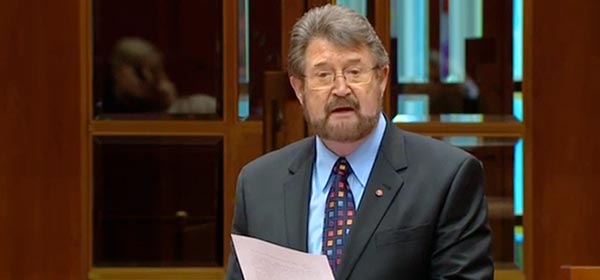Is it an abuse of a senator’s power to name and shame convicted child sex offenders?
Senator Derryn Hinch has been accused of abusing his right to parliamentary privilege by using his maiden speech on Monday night to name and shame a number of convicted paedophiles.
The controversial Justice Party leader told the chamber he would not be a “cowboy” with his newfound legal immunity, however he would use it as a “court of last resort” to follow through on his party’s objective to “name names”.
The primary purpose of parliamentary privilege is to enable senators and members to discuss issues that may otherwise lead to civil or criminal liability.
Under the protection of parliament, Mr Hinch named five convicted sex offenders, including some whose names are subject to a suppression order and who are currently serving time for child sex offences.
Queensland Council for Civil Liberties president Michael Cope said he wasn’t surprised by Mr Hinch’s move.
“It’s always been our concern that once Senator Hinch got the benefit of parliamentary privilege he would be abusing that power, and clearly he’s started off that way,” Mr Cope said.
“Well, quite clearly he hasn’t been able to restrain himself, not beyond even his first speech. Unlike when he was outside Parliament, there’s no process of a court being able to stop him from doing this, or punish him for doing this.”
Mr Hinch has previously been convicted and imprisoned on three separate occasions for breaching suppression orders and releasing the names of sex offenders.
When asked how he had managed his parliamentary privilege, Mr Hinch described it as “impeccable” and defended his actions.
“Impeccable. Impeccable. Haven’t abused it at all. Used it properly. Proud of it, and will do it again,” he said. “These are not first timers at all. These are serial sex offenders.”
While he disputes the use of suppression orders, Mr Hinch said he would not name an offender if it could also lead to identification of the victim.
While each Australian state has its own sex-offender register, Mr Hinch is pushing for a national list. He claimed that if Australia had had one in place, victims such as Jill Meagher and Queensland teenager Daniel Morcombe would still be alive.
Read more at www.abc.net.au
Read more at www.smh.com.au
Opinion: Is he right or wrong?
Was Derryn Hinch in the wrong when he named convicted sex offenders in the Senate?
That depends where you stand on the issue of judicial confidentiality and suppression.
There’s a reason Derryn Hinch made it into the Senate in the first place. From the start, he was clear that he’d be using his parliamentary privilege to name names. Clearly, there are Australians out there who want more transparency when it comes to public access to criminal information.
In 2014, the former journalist and broadcaster was found guilty of releasing the criminal history of Jill Meagher’s killer, Adrian Ernest Bayley. Mr Hinch elected jail time over paying a fine, and was imprisoned for 50 days.
Yesterday, he called his use of parliamentary privilege “impeccable”. So, what we see here is a man who is driven by his convictions. Unafraid to wield his power, prepared to face the backlash for his controversial actions and, if necessary, go to jail.
Mr Hinch is playing a dangerous game in some senses. While his motives may be noble, some of his defences struggle to hold water. For example, there is the chance that naming child sex offender’s names could lead to negative repurcussions for someone who shares the same name.
Mr Hinch’s defence is that, “If your name is Jim Smith, there may be a million Jim Smiths out there, but you would know very quickly this wasn’t the Jim Smith that committed this crime”.
Logically, this argument makes sense. However, try telling that to another ordinary Adrian Bayley whose job application is rejected because his name conjures a particular association in the hiring manager’s mind. Not even Mr Hinch can guarantee the impossibility of that happening.
Ultimately, we should consider the greater good and which actions will best serve the victims of sex offences, as well as help prevent future sex crimes. Whether Derryn Hinch rightly or wrongly named names, the fact is he has his own beliefs about the greater good (as well as a political party and parliamentary immunity through which to promote them), and he’s going to keep fighting for that. Shouldn’t we all fight for something?
Do you think Derryn Hinch abused his power by releasing the names of paedophiles? Would you want to see a national sex-offender register?
Related articles:
Human headline strikes again
The pain of paying

